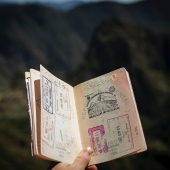Many times, we think that applying to study a program abroad is something difficult. We believe that the process requires many time and effort. However, we are convinced that what’s really important is to have the dream, and enough motivation and discipline to make it come true.
If you already have an adequate level of a second language (in the case you want to study a program that is taught in a different language than yours), the whole process of applying and getting prepare will take approximately twelve months. Check out the steps you should follow each month!
SEPTEMBER 2013
The first thing you must do is start searching for the information about the universities/institutions and the programs they offer. Before starting to do so, you should ask yourself:
· What type of course do I want to pursue?
· Where do I want to live and study?
· Do I want to live in a big or a small city?
· Which are the non-academic goals I want to achieve with this experience (like exploring Europe)?
· What’s the most important thing I want to accomplish with this experience (strengthen my proficiency of a second language, obtain an academic degree or acquire professional experience)?
During this stage, you should also look at:
· How does the education system works in the country of my interest?
· Which is the focus of the programs I like?
· Which are the mandatory and the elective courses?
· Who are the professors that teach the courses?
· Do you need to write a dissertation or not?
· How is the grading system?
Once you have finished the search of the programs of your interest and decided to which programs you will apply, you should have a clear understanding of:
· Which are the requirements for applying?
· Which are the application dates?
· How is the application process?
· Which are the costs of attending the program?
OCTOBER 2013
Once you know the application requirements of the programs of your interest, you must check if these require you to take a second language proficiency exam or a knowledge test. If so, October will be the month to:
· Register to take the exam that applies in your case. In this stage, it’s mandatory for you to look at the test dates in your city due that some exams can only be taken in specific dates of the year.
· Start a preparation course of the exam you have to take. Preparation courses are useful because they allow you to know and get use in depth to the methodology of the exam.
· Take several mock exams by yourself. You can find them in the institution where you are taking your preparation course or online.
· If you need to take more than one exam, it’s advisable that you focus in one exam per time.
NOVEMBER 2013
As soon as you have taken the language/knowledge exams, you can start focusing in meeting the other requirements for your application:
· Due that most universities leave for holidays in December, November will be the appropriate month for you to ask for your academic transcripts and certificates.
· Start asking for recommendation letters to your professors. Usually, in order to apply for a program abroad, universities will ask you to submit between 2-3 recommendation letters of professors you have done some work with during your undergraduate.
DECEMBER 2013
· Once you have received your official transcripts and your recommendation letters, you have to check if they need to be translated. If so, you must ask an official translator to do so.
· Check if any of the institutions of your interest requires you to notarize your official academic transcripts and your diploma. If so, we recommend you to look over the process with the governmental institutions of your country.
· December will also be the month for you to write your application essay. Most universities will ask you to send them with your application an essay where you should highlight the reasons why you are the ideal candidate to pursue the program.
JANUARY 2014
· Organize all your application documents (application format, transcripts, certificates, diploma, essay, recommendation letters, results of exams taken, financial information)
· Look in detail the information of financial assistance and scholarships provided by the University you are applying to as well as the application dates.
· Send your application to the institutions abroad.
FEBRUARY 2014
Once you have sent your application, it’s time for you to start analyzing the financial aspects of studying abroad:
· Do a realistic budget of how much does it cost to pursue the program you want, including items such as tuition and fees, living expenses, airplane tickets, setup expenses and materials expenses.
· Compare how much money you have saved with how much you need.
· Search for information about scholarships and financial sources available. It is important to look at the requirements to apply and the dates to do so.
· Get in contact with the institutions you applied to know the state of your request.
MARCH 2014
· If you are going to apply to an scholarship program, March will be the month to do so (taking into account that application dates vary for each program)
· This will also be the month to start looking in the website of the Embassy or Consulate of the country you chose, the application requirements for applying to a student visa (university requirements, economic capacity, language proficiency, health insurance and other documents)
· You should also check the expiration date of your passport. If it is near, you have to ask for a new one.
APRIL 2014
· Once you have been admitted to pursue the program abroad, you can start applying to the financial options that the University offers. Although some universities allow you to apply to their financial aids during the application process, others prefer to receive this request after the student has been admitted.
· Ask the University for the options and dates to pay the tuition and fees. If you have to do a transfer from your country, find out with your bank the costs of doing so.
· Check the availability of dates for your visa appointment.
· Find out what type of health insurance applies for students in the country where you are going to study. If there is no insurance option for students, this is the time to ask for quotas and buy one.
· Finish organizing all the require documents to apply for the student visa. If you have to translate some, this is the moment to do so (remember, always do translations with an official translator).
MAY 2014
· Submit your student visa application to the Embassy/Consulate of the country you will study.
· Start searching for accommodation options. Ask for a quota in at least three options.
· Start doing networking. Ask your friends and family if they know someone living in the country where you are going to study. It can be very helpful when you arrive without knowing anyone or when you need a temporary place to stay during your holidays abroad.
JUNE 2014
· As soon as you receive your student visa, buy the airplane ticket and look for possible discounts available for students.
· Take the decision of the accommodation you will stay in at least for the first month. Check out which expenses are included in the price, and arrange the payment.
· Pay the deposit for the accommodation. You must be completely sure this accommodation is trustful.
JULY 2014
· Go to the doctor and ask him to do you a general examination. Include a visit to the dentist and ophthalmologist.
· If you require special medicine, ask your doctor for the prescriptions and the medicines you have to take abroad. Also, ask your doctor for the generic names of the medicines to ease the search of these abroad.
· If you need any special vaccinations, find out how to get them and plan when to do so.
AUGUST 2014
· Find out the currency exchanges and buy in advance the money you need to take abroad.
· Ask your bank about the fees of withdrawing money abroad, as well as the fees for using your credit and debit card.
· Visit friends and family to say goodbye.
· Do a research about the country where you are going to live. Look for information about their culture and traditions, national festivities and places to visit.
· Cancel or suspend the subscriptions you have in your home country (internet, cell phone, magazines)
SEPTEMBER 2014
Before taveling:
· Pack your baggage taking into account the weight allowed by the airline, as well as the forbidden articles.
· Take 3 copies and also scan important documents such as your passport, your visa(s), the letter of acceptance of your university, your credit card, your health insurance, and your accommodation certificate. Leave one of each in your home country and take two with you (one in the hand baggage)
· Inform your bank that you will be living abroad so they don’t block your debit or credit cards for doing purchases abroad.
· Write down important addresses and phone numbers like the ones of your accommodation and your university. Also, take with you emergency numbers, map of the city where you will live and pocket money to buy the first transport tickets when you arrive to the airport.
When you arrive:
· Try to arrive one week before the beginning of the courses to get use to the city.
· Apply for your student id card to access to discounts.
· Register with the official authorities (like police and medical centers)
· Open a bank account to keep your money safe.
· Buy a cellphone to keep in touch with friends and family.
Congratulations, you made it! Now is time to study and enjoy the wonderful experience of studying abroad!










